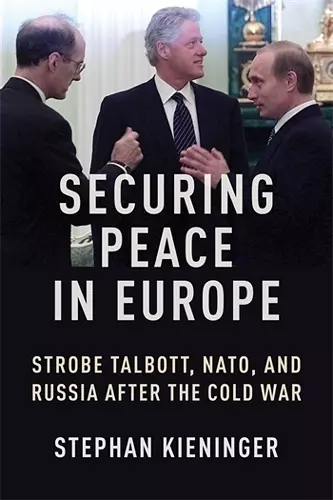Securing Peace in Europe
Strobe Talbott, NATO, and Russia After the Cold War
Format:Paperback
Publisher:Columbia University Press
Published:9th Sep '25
Should be back in stock very soon

After the Cold War, the United States and its NATO allies faced crucial questions. Could Russia, their old adversary, be integrated into the liberal international order? What roles should former Soviet republics and satellite states in Eastern and Central Europe play in the Euro-Atlantic security system? These questions have taken on renewed significance since Russia’s full-scale invasion of Ukraine, as Vladimir Putin has portrayed Russia as the victim of Western expansionism.
This deeply researched book offers new perspective on the NATO-Russia relationship through the eyes of Strobe Talbott, a deputy secretary of state for seven years under President Bill Clinton and the key US diplomatic broker for the former USSR. Stephan Kieninger traces the Clinton administration’s efforts to engage Russia and enlarge NATO at the same time, as elements of a new European security architecture. Drawing on Talbott’s diaries, as well as US and European archives and extensive interviews with former government officials, he sheds light on NATO’s opening, its missions in Bosnia and Kosovo, and other vexed issues. Kieninger argues that a careful look at Talbott’s statecraft rebuts Putin’s claims that the West exploited Russia’s weakness after the Cold War, demonstrating that the Clinton administration and its NATO allies sought to include Russia at every step. An illuminating and comprehensive account of US diplomacy during the Clinton years, Securing Peace in Europe provides vital insight into the complex relations between Russia and the West.
My longtime friend Strobe Talbott has had an extraordinarily influential career as a journalist, statesman, and scholar. I was fortunate to see his genius at work, first when we were roommates at Oxford when he was translating and editing Nikita Khrushchev’s memoirs and then when he joined my administration, first to oversee our policy on Russia and the states of the former Soviet Union, then from 1994 to 2001 as deputy secretary of state. Securing Peace in Europe digs deep into Strobe’s thinking, shows just how brilliantly his mind worked, and delivers valuable insights into why Eastern Europe looks the way it does now. -- President Bill Clinton
Kieninger highlights the crucial role Strobe Talbott played in seeking to integrate post-Soviet Russia into Western structures and create a European security architecture in which Russia had a stake. Essential reading for understanding why these policies ultimately failed and how Putin’s rise to power doomed Talbott’s important efforts to engage Moscow. -- Angela Stent, author of Putin's World: Russia Against the West and with the Rest
Kieninger offers an insightful account of American policy toward Russia, Ukraine, NATO, and the Kosovo crisis during the turbulent 1990s, told from the perspective of Strobe Talbott, President Bill Clinton's key advisor on those issues. This rich history explains US hopes for building a post-Cold War European security architecture and why the Russia piece fell short. -- Steven Pifer, former US ambassador to Ukraine
Stephan Kieninger has done a splendid job of examining US policy toward the former Soviet Union during the eight years of President Bill Clinton's administration and setting this in the context of the remarkable career of Strobe Talbott, the one-time translator and prominent journalist who became Clinton's most influential adviser on foreign affairs. This book is crucial for anyone wanting to understand how US foreign policy developed after the Cold War ended. -- Mark Kramer, Harvard University
Kieninger offers fresh perspectives on the evolution of Europe's post-Cold War security system and America's role in it, taking Strobe Talbott as a prism to analyze the ups and downs in the process. This nuanced and deeply researched book investigates how the Clinton Administration sought to include Russia at every stage. Essential reading for anyone with an interest in the vexed search for a new NATO-Russia relationship after the end of the Cold War. -- Wolfgang Ischinger, former German ambassador to the United States and the United Kingdom, former chairman of the Munich Security Conference (2008–2022)
Drawing on a multitude of previously untapped US sources including memos, letters, and diaries, Kieninger—by foregrounding Strobe Talbott’s key role as America’s foremost diplomat and Russia hand—has written an excellent, exhaustively researched, and highly illuminating study on the Clinton administration’s efforts to forge a sustainable post-Wall European security order. -- Kristina Spohr, author of Post Wall, Post Square: Rebuilding the World After 1989
ISBN: 9780231217712
Dimensions: unknown
Weight: unknown
376 pages